
Dr. Mario Manresa, a Southern Spain native from a family of several generations of pharmacists, completed his undergraduate degree in Pharmacy at the University of Alicante. His passion for improving treatment options led him to pursue a Master’s degree at the University of Valencia and an Erasmus internship at University College Dublin (UCD). In 2016, he earned his PhD from UCD, where he studied artificial hypoxia and its effects on colitis in mice under Professor Cormac Taylor. His research contributed to understanding how hypoxia signalling could reduce fibrosis, a common issue in Inflammatory Bowel Diseases like Crohn's disease and ulcerative colitis. Dr. Manresa’s interest in fibroblasts, particularly their role in inflammation and tissue maintenance, deepened during his PhD work, shaping his future research path.
Following his doctoral studies, Dr. Manresa completed postdoctoral training at Harvard Medical School and the University of California, San Diego, continuing his research on fibroblasts and inflammation. He was the first in his lab to focus on fibroblasts and contributed to developing a model to reduce fibrosis. His groundbreaking work on fibroblasts has expanded knowledge in this crucial area of cell biology. After holding a Project Scientist position at the University of California, San Diego, Dr. Manresa returned to UCD in 2022 as a Principal Investigator. He is currently an Ad Astra Fellow, Assistant Professor in the School of Biomolecular and Biomedical Science, and a faculty member of UCD’s School of Medicine.
Current Research Challenges
Dr. Manresa’s research seeks to identify what causes inflammatory bowel disease.
In a patient with IBD, at the cellular level, fibroblasts contribute to chronic inflammation and tissue remodelling in the gut, often leading to fibrosis and thickening of the intestinal walls. The disease affects millions of people worldwide and impacts the quality of life of patients, with limited therapeutic options. The ultimate goal of his research is to improve such therapies to boost the quality of life of patients afflicted by IBD. He believes that this research could have applications to other chronic diseases where fibroblasts have similar functions to those seen in IBD.
Dr. Mario Manresa's team works to understand how to potentially target fibroblasts in order to treat IBD. Current understanding is that fibroblasts are connective cells that signal to each other and communicate with their environment. In the case of people with chronic IBD however, fibroblasts communicate differently because their purpose has changed, and the question is: what made them change, and can we treat that? There are multifactorial generative factors that can predispose a person to developing the disease such as dietary factors, genetic changes or microbial exposure that take effect in IBD, and Dr Manresa has an interest in understanding how some of these factors affect fibroblasts.
Teaching and inspiring the next generation is a strong motivator for Dr. Manresa. His long term vision and hope is that the work that he is doing will inspire others and support others toward a collective goal of improving IBD therapy. He hopes that the students he supervises in his lab will in time have their own labs across the world, standing their own research and building the future.
Dr Manresa has made important findings related to the factors that drive inflammation in fibroblasts. He works to convince investors that the research he and his team do is productive, sustainable and likely to have an impact in society. It is important to him that more people are aware of the need for basic cellular and molecular discoveries, in order to create therapies and treat disease.
‘’We need to communicate molecular level science in a way that we can convince society and governments that it's important to understand the basics. Maybe it won't generate a patent next year, maybe it won't make you money next year, but in 10 to 20 years we may actually create better treatments, a therapy that tackles a medical problem and provides quality of life for a lot of people for a very long time’’.
Mario met his wife in Ireland, and when he is not researching —which he insists is not work but a real privilege and joy in his life—he enjoys travelling, snorkelling, and hiking. He aspires to hike the “tour of Mont Blanc”.
Future Research Aspirations
In the future, Dr. Manresa would like to continue his research work towards determining if we can fine-tune the immune capacity of fibroblasts to treat chronic inflammation as well as infection. His vision is to understand how the molecular changes that happen in fibroblasts modify the way they communicate with immune cells. Through this, Dr Manresa aims to modulate the immune response to reduce inflammation in the context of an overactive immune system, and also, to improve the response to infections. He believes that this will also require a better understanding of the long-term consequences that inflammation has on cells.
In discussion on the current insight in his field of research he shares,
‘’The study of fibroblasts is living a new era thanks to the discovery of their functional versatility. These cells were for many years understood to participate in healing and in conferring tissue structure. However, in the last decade, the field has seen a paradigm shift toward a vision of fibroblasts as active modulators of their environment, including the appreciation of their immune capacity. This has revolutionised the study of fibroblasts, which are now seen as a desirable cellular target with the potential to contribute to immune regulation’’.
A critical aspect to be able to fine-tune fibroblast functions is understanding what factors make them change toward a pathogenic type of cell, and what specific alterations happen at the molecular and genetic level in these cells. Understanding these changes may give us important clues to develop therapies that will restrain their detrimental functions, and may also allow us to restore their beneficial characteristics.